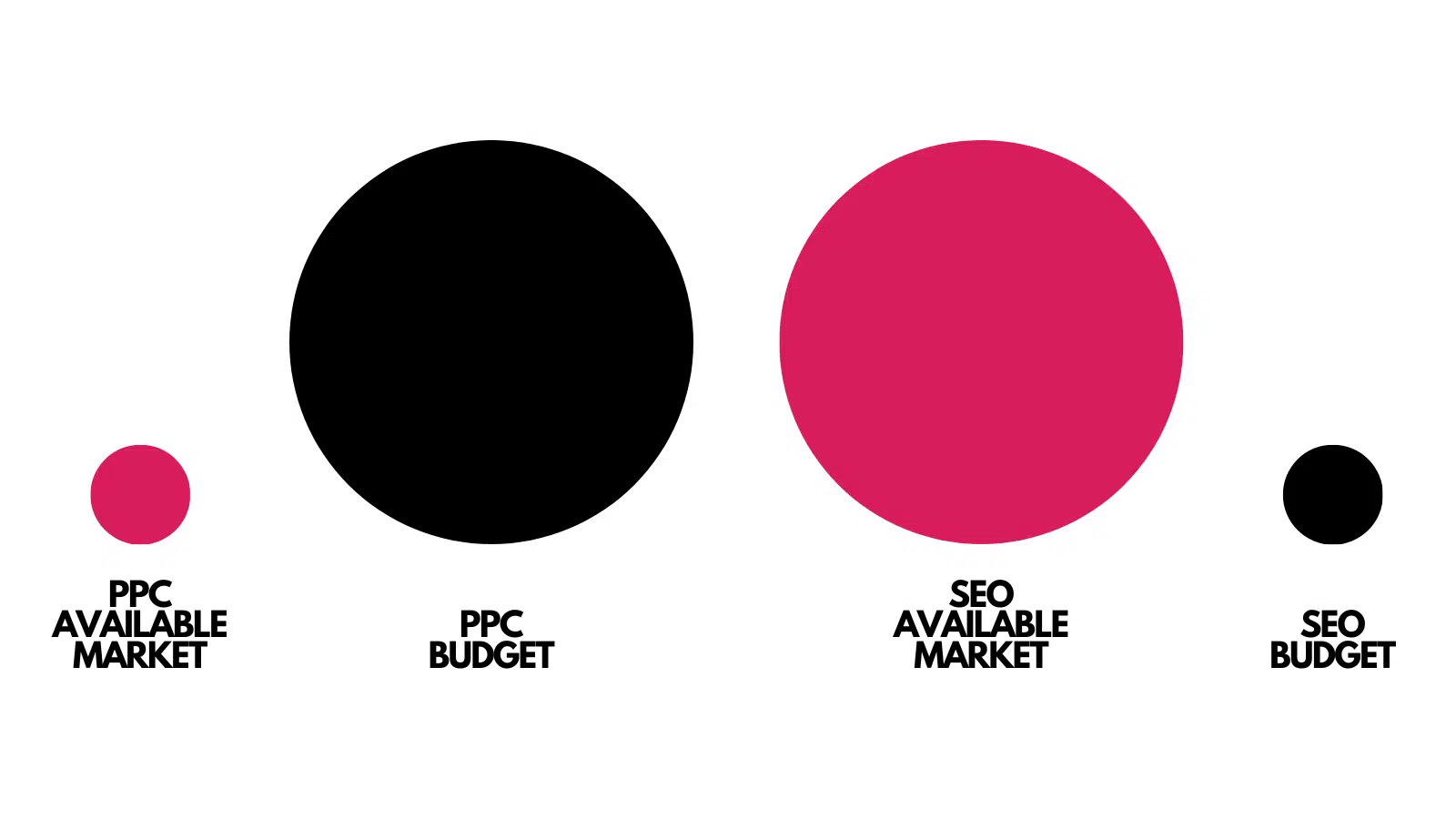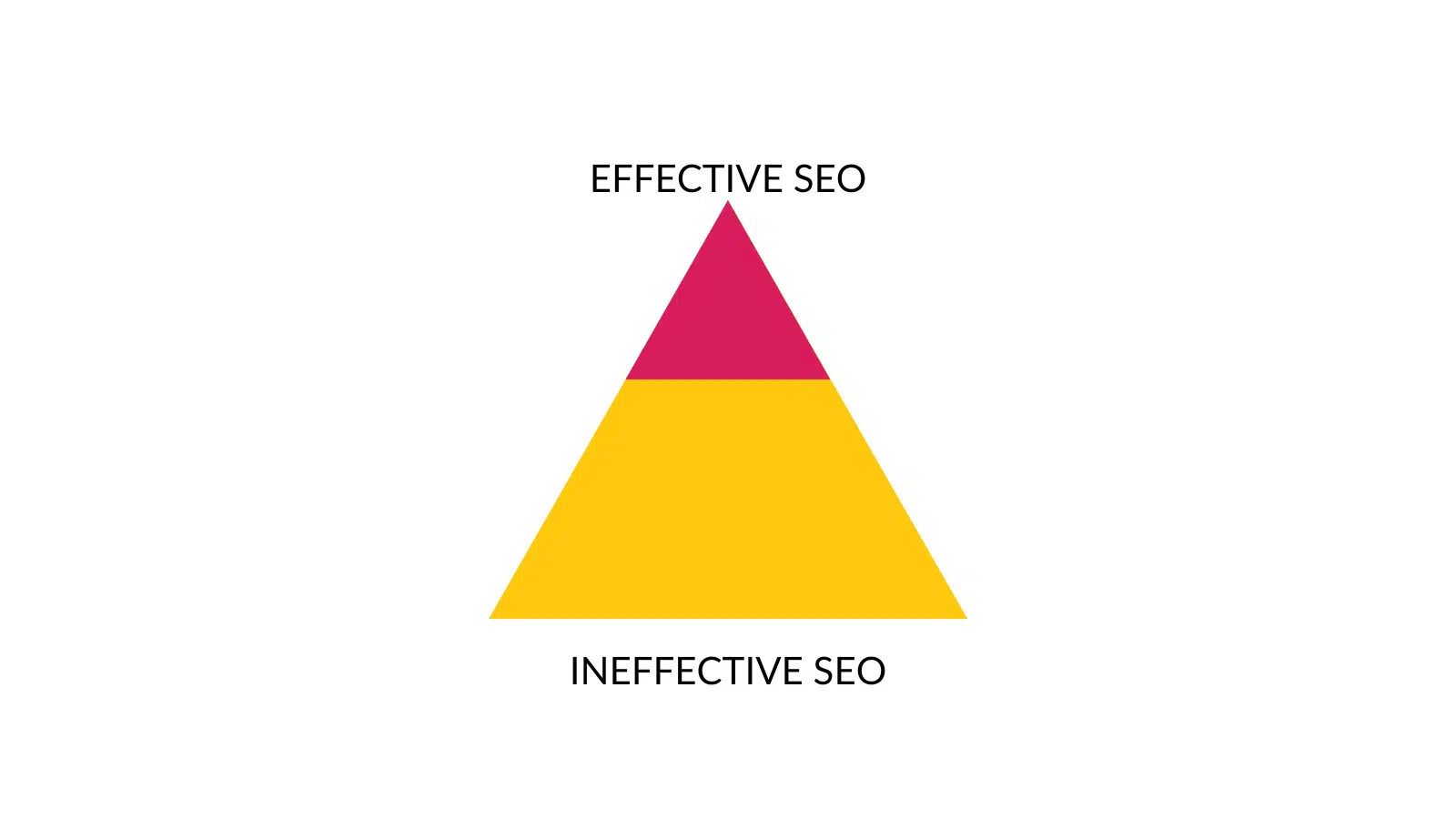Every day we hear marketers talking about the ROI of SEO.
This article explains why you need to stop thinking like that.
Why ROI is dangerous


Over the past few years, I’ve been digging deeper into the concept of ROI in marketing, thanks to research by marketing experts like Tom Roach.
Especially SEO ROI.
After all, the term has been used to end SEO retainers and even stop them from happening.
Therefore, when you use a term, you need to understand exactly what it means.
Thankfully, Tom expertly broke it down for us.
ROI is the net profit generated by an activity divided by the total cost of that activity.
Profit = Cost / Total Cost
And here we run into difficulties.
Because ROI is a measure of efficiency, not effectiveness.
Yes, ROI is a ratio. It’s not sales.
And this is where the ROI starts to fall apart, making it dangerous to use for SEO.
budget realism
For most SEOs, the idea of getting a six-figure budget is a dream come true.
Yes, most SEOs still use the $500 to $2,000 per month model.
but why?
This is mainly because SEO is the worst selling point in marketing.
“If you pay now, you’ll see results in 6 to 12 months. Oh, and results are not guaranteed.”
This quickly creates risk aversion and people start taking budgets out of thin air.
If you’ve been involved in SEO for a while, you’ve probably heard this line.
“We will start small and once we see some profit, we will invest more.”
And this is where things start to fall apart.
Because SEO doesn’t work like that.
Either invest in getting the job done or waste your money.
Dig deeper: What percentage of your budget should you spend on SEO?
Monthly Report: ROI Destroyer
There’s nothing like being the last agency your clients use.
By the time you are the last SEO agency in a row, most of the work is probably done.
Our clients rank in the top 11-15 for key terms, and with a little nudge we can all win and jump into the SEO prize.
Actually, before that, the previous three or four agencies all tried and did a little bit of work.
Each institution built on the successes of the previous and each achieved the results it promised.
The problem is that we either needed more money or the money was spent on the wrong things.
Either way, clients will quickly become bored if monthly reports show little or no results or progress.
And here lies the core issue of SEO.
The less you pay, the longer it will take to see results.
This brings us to the next question regarding ROI.
You won’t get any return on your investment until you rank up.
That’s it! The client signs the retainer and waits for the SEO to do its magic.
And here’s the problem.
distance.
As I said, it’s fun to be the last agency. It may be difficult to become an agent before this happens.
Because there is always a starting point.
This means that it will take a certain amount of time for the client to rank, and then you will start seeing some results.
And this is the low investment death loop for SEO.
Customers want to see some return before making additional investments. Therefore, they make small investments.
Your website needs more authority, but it is too far away from the buyer’s intended keywords to generate results.
Clients leave agencies and move on to other agencies, making repeated low-cost investments. And over time, you end up increasing your rankings or giving up on SEO altogether.
And so is the graveyard of another retainer, ROI.
SEO is an investment in your business, and like most investments, it takes time to see a return.
Dig deeper: Why next year’s SEO results depend on this year’s SEO efforts
Get the daily newsletter search that marketers rely on.
People don’t know what ROI actually means
Tim Ambler, professor of marketing at London Business School, said:
“ROI was designed to evaluate capital projects that are invested once and then provide benefits over several years.”
And this is the core question when people look at SEO ROI.
What they usually mean is “sales.”
A client logs into an analytics dashboard and attributes some sales to organic search.
ROI is not the number of monthly sales increases.
SEO increases business profits, but we measure it by sales
Most people look to SEO to increase the number of leads and sales coming into their business.
And why do people want it? Because more sales means more money flowing into your business.
But the real power of SEO is putting your business in front of people in your market who can buy without paying per click.
The nature of PPC (paid search) also seeks to reduce waste by targeting only those who are most likely to buy today. Not only does SEO help you reach people who are researching your category, but because of its high organic click-through rates, you can reach more buyers today.
Simply put, SEO puts your business in front of more potential customers without having to pay for every click.
Additionally, SEO also reduces the need to spend on paid search.
You will be able to understand how SEO works.
- Increase sales volume by reaching more buyers.
- Reduce the need to spend on paid search.
- This reduces reliance on paid search.
The above will increase the profits of the company.
Learn more: How long does it take for SEO to work?
Rather than measuring SEO performance by ROI, justify the investment.
When I consult, I always ask companies how much they spend on paid search.
Almost always in large quantities.
And this is the role of SEO.
The ROI is to reduce paid search spend and increase sales volume.
So if you’re paying $100,000 a year for paid search, the ROI of SEO is reducing the need to spend that $100,000.
You can also reach more buyers without paying per click, which means more sales and more profits.
This means justifying the cost of investing in SEO through ROI. You can’t measure performance that way.
So how do you measure that performance?
Measure SEO effectiveness, not ROI


There’s a lot of noise when it comes to SEO. But using the word “effect” drowns out the noise.
Because efficiency can be directly linked to the goal of generating more business profits.
However, please note that effectiveness can only be determined after ranking for the buyer’s intended keywords.
That’s when you start the clock.
Then, after a long enough period of time (depending on your buying cycle), you can stop and measure its effectiveness.
It should show up in your sales.
Remember, sales are counted, not sales credits. We’re not trying to analyze where the last click came from, we’re looking at the increase in sales since organic rankings occurred.
Focus on effectiveness, not vanity metrics


There is something I would like to point out here.
The effectiveness of SEO to grow your business’s sales (and profits) is important.
I often see SEOs talking about conversions to becoming an “email subscriber.”
Sure, it’s technically a conversion, but all you’ve really done is grow your email list.
You should nurture this lead over time through email and expect it to convert in the future.
This is not the best way for brands to leverage SEO. In fact, the cost of doing his SEO to grow your email list should be compared to other methods such as Facebook advertising.
Traffic is pointless. Profit is sane.
When it comes to performance SEO, the question is simple.
Is SEO an effective way to increase profits and sales?
And you can figure out what your benefits are.
But we need to talk about investing.
Dig deeper: How to determine which SEO metrics matter
SEO is a sunk cost
This article does not discuss predictions.
The main reason for that is because it’s mostly a waste of time and, let’s be honest, it’s probably pretty easy to predict if your business is powered by paid search.
If you aren’t using SEO for growth, you need to find another way. Otherwise, you will become stagnant or stagnant.
This is why ROI is so risky when measuring SEO performance.
Because they seek to reduce risk and grow investments based on perceived returns.
Every company would like to live in a perfect world, where for every dollar they spend on marketing, they get $5 back. But the world isn’t perfect.
SEO is a sunk cost.
Once you decide to invest in SEO, your money is gone.
If you are not getting results, you should evaluate the effectiveness of your SEO agency, staff, or freelancer.
And your budget.
These are all sensible and logical arguments.
It is absolutely right to talk to management and suggest that the budget is not enough to achieve the desired results.
Every business needs to understand that SEO is like winning Wonka’s golden ticket.
This is a race that the people at the top of the SERPs started long before you did, and have spent far more money getting there. and spend money to stay there.
But this is a growth strategy and should be funded as such. It’s not a “test”.
The rules of SEO are simple.
- Justify your SEO investment through ROI potential.
- Measure performance through ranking and search share for buyer-intended keywords.
- And once you rank, you can measure the impact of your SEO through profits and sales over time.
Measuring SEO performance through ROI is a bit like measuring your children’s success while they’re in school.
To put it more bluntly.
If you spend $100,000 a year on paid search, you’ll spend $500,000 over the next five years.
SEO can significantly reduce costs and potentially save you $500,000.
But that’s not possible when you have a small monthly budget and are asked, “Where’s the ROI?”
When investing in SEO, make sure your budget matches the problem and the possibilities.
SEO can help you double or triple your sales while reducing paid search costs. All of which lead to increased profits.
However, using an effective strategy requires time, proper investment, and SEO.
When all of the above happens, SEO magic happens.
The opinions expressed in this article are those of the guest author and not necessarily those of Search Engine Land. Staff authors are listed here.


